- Home
- Leslie North
Claiming The Cowboy Page 4
Claiming The Cowboy Read online
Page 4
“What the hell does that mean?”
“Remember when you came home and told Dad you wanted to become a vegetarian because Ivy Makepeace was a vegetarian? He laughed you out of the house. Then we all got in line and laughed you back to your senses. It’s like you are incapable of being smart and infatuated at the same time.”
This time, Chase got creative with his middle fingers, fiddling with the lit radio dials.
Wes laughed.
“I’m not infatuated with Gretchen de Havilland. She’s standing in my way. I have to turn up the charm a little.”
Wes shook his head. “You are in so far over your head with this one. She’s got more letters in the diplomas on her wall than you had in your sugary breakfast cereal.”
“I can be…intellectual.” Chase straightened his tie.
“Who wears the helmet to work?”
Even before the professional ruling that all riders born since 1994 were required to wear helmets, Wes protected himself. Yancy’s gospel. Still, the jokes got old.
“Just work on changing her mind, not her clothes. She’s good people, brother. And she’s been through a lot. This is personal for her, if you remember.”
Chase tracked the road’s center dashes in the headlights, turning Wes’s words over and over in his mind until they blurred into one yellow stripe and he remembered what Wes was talking about. When he did, he felt like road kill—thwomp—under the tires. Way back in early elementary school, before girls snagged his attention, before daily barrel practice at Yancy’s, before his own family had experienced acute loss, Gretchen de Havilland’s mother was T-boned by a drunk driver and killed.
Fuck.
How could he have forgotten? No wonder her mindset was so Prohibition. She wasn’t fighting him from some moral high ground. She was simply fighting him from a place of avoidable loss.
They reached the ranch after dark. Willie brought out the reserve samples Chase had brought from the distillery. Nat distributed shot glasses shaped like boots—their father’s favorites when he celebrated. Chase didn’t much feel like drinking. He retired to his room—the same one he’d had as a boy all those years ago when he barely noticed a shy redhead with pigtails and glasses. Wes was right about one thing. Gretchen was different than the girls who normally threw themselves at him. But his brother was wrong about something else. Very wrong. Chase could be smart. And if infatuation came along for the ride? Well, he had ridden meaner bulls than that.
4
On a quiet street in the best small American town, Gretchen padded out to her front porch, hair damp from the shower, slippers and button-down pajamas keeping the cool April air at bay, and joined her father on the swing. Bias aside, who could argue? In a place where silence had a sound, thoughts had room to breathe, and everyone cared for one another like family, her protectiveness could be, at times, fierce. She had felt it on this night, perhaps more than other nights, after the display at the meeting. So Chase had been right about embracing the unplanned. That didn’t mean he was right about changing the character of the best small American town.
“I was thinking about moving some of this porch stuff out.” Her father closed his copy of the latest police procedural to hit the bestseller list and took a sip of warm milk from the mug in his hand, the way he ended each day. “Maybe donating it to the senior center for their new garden.”
“Why?”
“More room.”
“This is my favorite place. I won’t allow it,” Gretchen said in a mock-princess tone—the one she affected when they joked about her having the keys to the kingdom.
Her father chuckled and removed his reading glasses.
She absorbed the sway of the swing and matched the cadence through her heels. With early-onset physical ailments, her father seemed frailer these days. She was glad to be here to pick up the slack.
“These tiny light strings in the rafters are perfect for when we host out-of-town guests so they can find our address,” said Gretchen. “And that wicker sofa over there has the best sunset view in Marin County. Also, it’s Lincoln’s domain.”
Their black Labrador perked up at the mention of his name. His brass tags clinked together. He blinked at Gretchen with adoring wet eyes, often her most captive audience. Definitely her number one fan.
“Your mother always did know how to make a home feel welcoming.”
“And all the plants?” She stroked a broad, waxy leaf of her mother’s prized container citrus tree that usually yielded one cherished lemon per year, despite being outside a tropical growing zone. “There isn’t anything that doesn’t grow here.”
“There is one thing.”
At her questioning gaze, her father stared back at his crossed hands, his lap, so unlike the opinionated and forthright man who raised her to be the same.
“You,” he said simply. “We haven’t so much as moved a pillow since she’s been gone. And you should have your own place. You’re the mayor, and you still wash an old man’s underwear.”
“Dad, we’ve been through this. I’ve lived in tiny little rooftop apartments where I could see the Pacific from my balcony. I house-sat a six-million-dollar estate in Atlanta while I was studying for the bar exam. I lived on a houseboat in Italy the summer after my senior year. None of them did for me what this porch does. What you do. This place centers me. Someday I’ll move on, maybe get elected to Austin, but right now, I need you more than ever.” She took his hand in hers and squeezed. “Besides, single-family dwellings are at a premium here, and the developers who have expressed interest are waiting for the employment scales to tip.”
“You mean like the addition of a quarter of a million-dollar bottling operation that employs dozens of people in construction, maintenance, service, and entertainment?”
“Not you, too.”
“Takes both sides—”
“To build a bridge. I know.”
“That kind of growth is hard to turn down. I want to make sure you’re doing it for the right reason. If it were a textile or cottonseed operation, you wouldn’t bat an eye.”
“Textiles and cottonseeds don’t kill people.”
“Neither do businesses. What happened was human error, a bad decision. He’s moved on, Gretchen. Made peace with the little life he has left since he got out of prison. You should, too.”
“This has nothing to do with the man who killed Mom. All those places I lived? They challenged me, but they also made me see how much this town needed…someone. Every time I came home, another store on Main had gone out of business, another broken bridge or silo crumbled on the landscape. No one else stepped up to be that someone. I couldn’t watch it deteriorate anymore. Not this place that meant so much to her.”
Her father kissed her temple. She placed her head on his shoulder. The night stretched. Lincoln snored.
“I’ve known you were meant to do great things since the day you came home from school and had convinced the superintendent to sell advertisement space on the side of school busses to pay for upgraded computers. You’re the most amazing person I know. If there’s anyone who can turn this town around, it’s you, but don’t let smoke from that fire inside you obscure your view.”
Those tears that had threatened all day ramped up again, but she would wait.
“I’m going to bed.” Her father gathered his belongings and made his slow trek toward the front door. “Too many fireworks at the city council meeting for these old bones.”
Fireworks? Had they attended the same meeting?
“I thought all the concerned citizens were on their best behavior,” she said.
“They were. Those weren’t the fireworks I was talking about.”
Oh.
Oh.
Ew.
Her stomach crumpled in on itself. There was something wrong about discussing her love life—or lack thereof—with her father. More disturbing was that he, a man who needed coaching on the remote to the satellite dish to record his cop shows, thought her a tad more ob
vious than Bettye Lindsey.
Lincoln gave an understated wrooo-oof. Likely because Dad was going inside. Also because opinions around the de Havilland house were never in short supply.
“Darcy left you a box on the steps.” Her father held the screen door open enough for Lincoln to slip through, and they both disappeared inside.
Gretchen lugged the box over to the wicker sofa and began to sort papers, grateful for the stillness of the night. In one pile, she placed information about the lineage of the Clarks and Pettigrews, descendants of the two men named in the land dispute in 1839—essentially the founding fathers of Close Call. In another pile, she gathered everything related to the parcel of land on the 1100 block of Main. True to her awesomeness, Darcy had bundled and labeled official documents related to landholder changes over the hundred and fifty-year history in chronological order. At the base of the box, Gretchen found papers containing the names Andrew C. Clark and Oscar Pettigrew.
According to Judge Marshall’s notes, “Andrew C. Clark, Esq., claimed he and his wife, Mary, expectant with child, had arrived two fair seasons prior, to clear the land in question, construct a foundation upon which their homestead was to be built, and plant corn, cotton, sugarcane, and Irish potatoes. One month later, Mrs. Clark became ill. Unable to find proper medical care, the Clarks returned to St. Louis. Shortly after, Oscar Pettigrew and family arrived at the same parcel of land, believed it to be abandoned based upon the early stage of construction, severe neglect of the crops, and statements made to witnesses that Andrew Clark did not like Texas and did not intend to return. Pettigrew filed claim to the land through proper channels. Andrew and Mary Clark returned to the property in September 1837, having lost their unborn child and wishing to resume settlement upon the land. Although Mr. Clark showed intent for residency through preliminary work against the land, his claim that the paperwork he completed in May 1837 was deliberately misfiled remains unsubstantiated. Andrew C. Clark has failed to satisfy ownership of the land in question. This court finds in favor of the defendant, Oscar Pettigrew, as rightful owner of the land.”
One more note followed the ruling: “Pettigrew testified that a fire was set at sundown on the evening of December 5, 1838, under suspicious circumstances, after he and his wife had gone to bed, and that escaping with their lives proved to be a close call. This court finds no evidence to support Pettigrew’s allegation that Andrew Clark set the fire.”
Gretchen shuffled a few more papers until she found a photocopy of a hand-drawn map outlining the river, Pettigrew’s house and crops, the lineage Darcy outlined…oh, God.
Pettigrew—Jasper—Meier.
Clark—Pickford—Pickford.
Gretchen pressed a hand against her rolling belly.
The land now known as 1100 South Main, land that had widely been known to be owned and leased out to various businesses by the Meiers for as far back as anyone could remember, began the bad blood that echoed through the Pickford and Meier descendants to the present day. Had Andrew Clark, Esq., been a proper lawyer, he might have challenged the ruling, appealed for an impartial court away from the property, subpoenaed the same witness who wrote out his statement on an all-but-forgotten, sketchy slip of paper, the very last paper in the file—admissible or not?—to testify that Andrew Clark had, in fact, filed a proper claim prior to Pettigrew.
As it stood, this paperwork was the single greatest plan B Gretchen could have imagined. If the zoning vote went her way, the feud’s origins could remain a buried footnote to Close Call’s history, good and legal for more than 160 years. No need to add fuel to the already incendiary relationship between the Meiers and Pickfords and introduce divisiveness into her town; that move would be sure to hurt good people and cost both sides a substantial amount of money. But if the council voted to rezone…well, the slippery slope of debauchery, with bars popping up on every corner of her town and drunks navigating the highways, could be easily avoided by unearthing ancient history, facts certain to tie the two families into a legal tangle that would far outdistance the building of a distillery at 1100 South Main.
An inspired plan B. So why did it feel like she just swallowed a handful of nails?
She repacked the files neatly, carried the box to the kitchen table, and reached into the cabinet above the refrigerator for the strongest elixir she had in the house: a bubblegum pink liquid that tasted like a chalky puree of questionable ethics.
Ebba Howard had ahold of Close Call’s purse strings as if they were a Sunday plate offering in a room full of con artists. In her former life, before jacking her hair to Jesus and calling on the masses to pray for the Almighty to grant Marin Missionary Baptist enough funding to open a family center the size of Waco, Ebba had been an accountant, classically trained in being fiscally tight enough to raise a blister.
For this talent, Gretchen was eternally grateful.
However, on the morning after she learned that the bedrock upon which the town had been built was shakier than quicksand over a fracking hole, Ebba’s bad news was the last thing Gretchen wanted to hear.
“Those enticements that our irresponsibly-departed organizer, Penny, promised for the sesquicentennial aren’t possible with what was allocated. Part of the funding was supposed to come from the entry fees to the historic home tour, but she up and ran off to Waxahatchie with her…” Ebba’s voice grew conspiratorial. “Lover. Livin’ in sin, she was, instead of following through on her commitments.”
Gretchen was afraid to ask. “How much more money do we need to pull this event off?”
“Well unless you know someone who knows Jerry Jones, we’ll be looking at a longest beard contest and a church service, instead of a hot air balloon lift-off at dusk and an appearance by George Strait’s second cousin’s uncle. I have heard he is quite something on the accordion.”
Tempted to politely scoot her chair back from her desk and bang her forehead on its hand-carved glory, Gretchen sucked her cheeks between her molars and asked again, this time with a scary-tense control over her tone. “How much, Ebba?”
“All said and done?”
“Yes.”
“Civil services for public safety and clean up included?”
“Yes.”
“One hundred thousand.”
Gretchen nearly slipped out of her chair. “Please tell me you’re speaking in half-dollars.”
“Invitations sent out to every dignitary within a two-hundred mile-radius, alone, was close to a thousand dollars, engraving and postage.”
“Dignitaries” meant police chiefs and school superintendents and the occasional elected produce queen.
“Who approved that?”
“You know the first success of any party is the anticipation,” Ebba said. “Besides, I was under the impression Penny’s zeros on the purchase order were happy faces.”
“Ebba!”
“Weeelll…I thought we were friends until she ran off with that hooligan.”
Gretchen reached into the side drawer of her desk and pulled out the invitation: tri-fold, of the finest quality; outside, a shimmery foil emblem of Close Call’s pride and joy—the Gulverson and the Company of Giants sculpture; inside, a whimsical font that screamed family fun and sesquicentennial; and a thin border that transitioned white to red to blue in a grand show of Texas and American patriotism. It was the most divine invitation Gretchen could have hoped for to attract people to her fine town, but it didn’t really speak to longest beard contests and tent revivals.
Ebba lowered herself into the chair opposite Gretchen’s desk. Her voice came like gossip on a breeze—half-whispered, half-appalled. “There’s only one business knocking on the doors to this town that can invest the money to throw a celebration worthy of that invitation.”
“That’s no reason to invite an alcohol distributor into our town, Ebba.”
“Who says they have to stay permanently? A little marketing can’t hurt them, and it sure would get us out of this pickle.”
“It would be wrong,
Ebba. Using them that way.”
Wouldn’t it?
“Right. Well then, I’ll just look into pulling off a heist in New Braunfels next weekend, and you can head down to The Gritty Somewhere and ask those mouth-breathing crumb catchers to cough up an entry fee to enter a beard contest.”
For someone so godly, Ebba could wield the golden staff of sarcasm like Moses when it suited her.
Gretchen thought back to Chase’s game. How at every turn, he had used fame to his advantage. Well, she had some advantage here, too. The inertia of an entire town she felt sure would come down to her way of thinking. What would a temporary sponsorship hurt? So long as their arrangement was clear. It was the only way she could live with herself while she figured out a way to save her beloved town.
5
Chase’s early morning consisted of meeting an out-of-town plumbing professional who specialized in large-scale, industrial buildings. The pipes in the old warehouse were a mess and one of the biggest conversion expenses the distillery would face. If the space hadn’t already had so much raw potential and charm with abundant brick, thick oak scaffolding, and space to expand on all sides, Chase’s investor team would have passed on it.
After the meeting, he walked the interior, snapping digital pictures to start the bidding process for construction and design companies from Austin, Dallas, Houston. Places that would bring an element of sophistication to the brand while still preserving its roots.
Deep at his core, he believed the distillery would be good for the town. Independent-label whiskey and fine spirits catered to a distinctive crowd. Educated. A crowd with money. A crowd who drove European import SUVs and lived in sprawling ranch-style homes and worked full-time at impressing others. And deep at his core, Chase believed the distillery would be good for him. He needed an excuse to stay home, to let the circuit buzz die, to hang his hat on a new dream. Following up being a champion with losing this place wasn’t an option.

 Elkin Brothers Christmas: The Complete Series
Elkin Brothers Christmas: The Complete Series Protecting His Beautiful Lover (Southern Soldiers of Fortune Book 3)
Protecting His Beautiful Lover (Southern Soldiers of Fortune Book 3)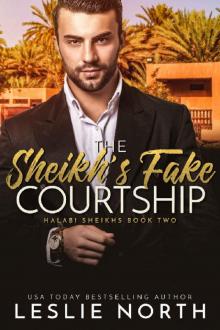 The Sheikh's Fake Courtship (Halabi Sheikhs Book 2)
The Sheikh's Fake Courtship (Halabi Sheikhs Book 2) The Billionaire King’s Heir (European Billionaire Beaus Book 3)
The Billionaire King’s Heir (European Billionaire Beaus Book 3) The Cowboy’s Pregnant Sweetheart (McCall Ranch Brothers Book 3)
The Cowboy’s Pregnant Sweetheart (McCall Ranch Brothers Book 3) SEAL’s Accidental Family: SEAL & Veteran Series: Book Two
SEAL’s Accidental Family: SEAL & Veteran Series: Book Two The Sheikh’s Convenient Bride (Omirabad Sheikhs Book 1)
The Sheikh’s Convenient Bride (Omirabad Sheikhs Book 1) Guarding the Single Mother (SEAL Endgame Book 1)
Guarding the Single Mother (SEAL Endgame Book 1) The Billionaire Prince’s Daughter (European Billionaire Beaus Book 2)
The Billionaire Prince’s Daughter (European Billionaire Beaus Book 2) The Sheikh’s Blackmailed Bride (Sheikhs of Al-Dashalid Book 2)
The Sheikh’s Blackmailed Bride (Sheikhs of Al-Dashalid Book 2) The Sheikh’s Fake Engagement (The Blooming Desert Series Book 1)
The Sheikh’s Fake Engagement (The Blooming Desert Series Book 1) Beckett Brothers: The Complete Series
Beckett Brothers: The Complete Series The Sheikh's Untameable Lover (The Tazeem Twins Series Book 4)
The Sheikh's Untameable Lover (The Tazeem Twins Series Book 4) The Billionaire’s Second Chance Christmas (Christmas with the Denton Billionaires Book 3)
The Billionaire’s Second Chance Christmas (Christmas with the Denton Billionaires Book 3) Protecting His Kidnapped Family (Southern Soldiers of Fortune Book 2)
Protecting His Kidnapped Family (Southern Soldiers of Fortune Book 2) The Billionaire’s Pretend Girlfriend (The Billionaires Club Book 2)
The Billionaire’s Pretend Girlfriend (The Billionaires Club Book 2) Sheikhs of Hamari: The Complete Series
Sheikhs of Hamari: The Complete Series The Sheikh’s Pregnant Lover (Sheikhs of Al-Dashalid Book 1)
The Sheikh’s Pregnant Lover (Sheikhs of Al-Dashalid Book 1) Sovalon Royals: The Complete Series
Sovalon Royals: The Complete Series Hasan Sheikhs: The Complete Series
Hasan Sheikhs: The Complete Series The Billionaire’s Secret Son (Preston Brothers Book 2)
The Billionaire’s Secret Son (Preston Brothers Book 2) The Sheik's Reluctant Hostage (The Quabeca Sheiks Series Book 2)
The Sheik's Reluctant Hostage (The Quabeca Sheiks Series Book 2) The Billionaires Club- The Complete Series
The Billionaires Club- The Complete Series The Sheikh’s Pregnant Love: The Karawi Sheikhs Series Book Three
The Sheikh’s Pregnant Love: The Karawi Sheikhs Series Book Three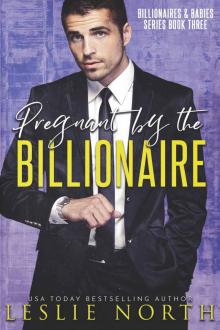 Pregnant by the Billionaire (Billionaires & Babies Book 3)
Pregnant by the Billionaire (Billionaires & Babies Book 3) The Sheikh's Surprise Twins (Qadir Sheikhs Book 1)
The Sheikh's Surprise Twins (Qadir Sheikhs Book 1) The Billionaire’s Sudden Christmas Baby (Christmas With the Denton Billionaires Book 2)
The Billionaire’s Sudden Christmas Baby (Christmas With the Denton Billionaires Book 2) Cowboy's Unexpected Family (Thorne Ranch Brothers Book 1)
Cowboy's Unexpected Family (Thorne Ranch Brothers Book 1) Guarding His Unexpected Twins (SEAL Endgame Book 3)
Guarding His Unexpected Twins (SEAL Endgame Book 3) SEAL & Veteran Series: The Complete Series
SEAL & Veteran Series: The Complete Series The Sheikh's Marriage Bargain (Hasan Sheikhs Book 1)
The Sheikh's Marriage Bargain (Hasan Sheikhs Book 1) The Billionaire Prince’s Nanny (European Billionaire Beaus Book 1)
The Billionaire Prince’s Nanny (European Billionaire Beaus Book 1) The Billionaire’s Accidental Baby: Billionaires & Babies Book One
The Billionaire’s Accidental Baby: Billionaires & Babies Book One The SEAL’s Pregnant Ex (The Admiral’s SEALs Book 3)
The SEAL’s Pregnant Ex (The Admiral’s SEALs Book 3)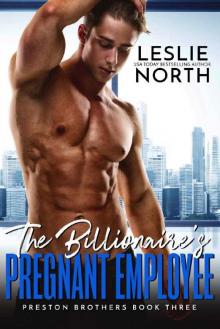 The Billionaire’s Pregnant Employee (Preston Brothers Book 3)
The Billionaire’s Pregnant Employee (Preston Brothers Book 3) The Cowboy’s Second Chance Family (Wells Brothers Book 3)
The Cowboy’s Second Chance Family (Wells Brothers Book 3) The Sheikh’s Rescued Baby (Hasan Sheikhs Book 3)
The Sheikh’s Rescued Baby (Hasan Sheikhs Book 3) Protecting His Pregnant Lover (Southern Soldiers of Fortune Book 1)
Protecting His Pregnant Lover (Southern Soldiers of Fortune Book 1) The Sheikh’s Secret Child: The Karawi Sheikhs Series Book Two
The Sheikh’s Secret Child: The Karawi Sheikhs Series Book Two The Sheikh’s Pregnant Foreigner
The Sheikh’s Pregnant Foreigner Sheikhs of Al-Dashalid: The Complete Series
Sheikhs of Al-Dashalid: The Complete Series The Sheikh’s Wife Arrangement: The Safar Sheikhs Series Book One
The Sheikh’s Wife Arrangement: The Safar Sheikhs Series Book One The SEAL’s Instant Family
The SEAL’s Instant Family The Sheikh’s Pregnant Wife (Hasan Sheikhs Book 2)
The Sheikh’s Pregnant Wife (Hasan Sheikhs Book 2)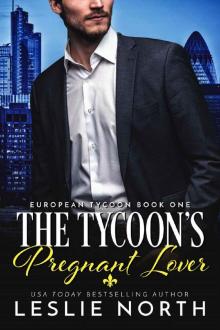 The Tycoon’s Pregnant Lover (European Tycoon Book 1)
The Tycoon’s Pregnant Lover (European Tycoon Book 1) The Russian's Stubborn Lover (The Fedosov Family Series Book 1)
The Russian's Stubborn Lover (The Fedosov Family Series Book 1) Grant Brothers Series: The Complete Series
Grant Brothers Series: The Complete Series The Billionaire Chef’s Baby (McClellan Billionaires Book 2)
The Billionaire Chef’s Baby (McClellan Billionaires Book 2) The Sheikh's Captive American (Zahkim Sheikhs Series Book 1)
The Sheikh's Captive American (Zahkim Sheikhs Series Book 1) The Sheikh King's Ward (Halabi Sheikhs Book 1)
The Sheikh King's Ward (Halabi Sheikhs Book 1) The Sheikh's Christmas Baby
The Sheikh's Christmas Baby The Sheikh's Amulet (Sheikh's Wedding Bet Series Book 3)
The Sheikh's Amulet (Sheikh's Wedding Bet Series Book 3) The Sheikh’s Accidental Heir (Sharjah Sheikhs Book 2)
The Sheikh’s Accidental Heir (Sharjah Sheikhs Book 2) The Sheikh's Pregnant Employee
The Sheikh's Pregnant Employee Safe and Sound (The Safe House Series Book 3)
Safe and Sound (The Safe House Series Book 3)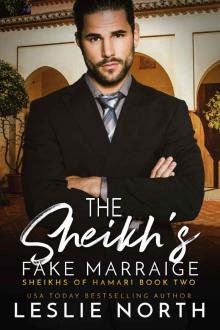 The Sheikh’s Fake Marriage (Sheikhs of Hamari Book 2)
The Sheikh’s Fake Marriage (Sheikhs of Hamari Book 2) The SEAL’s Beautiful Nanny (The Admiral’s SEALs Book 2)
The SEAL’s Beautiful Nanny (The Admiral’s SEALs Book 2) SEAL Guardian (Brothers In Arms Book 3)
SEAL Guardian (Brothers In Arms Book 3) The Cowboy’s Rescue (McCall Ranch Brothers Book 2)
The Cowboy’s Rescue (McCall Ranch Brothers Book 2) The Billionaire's Pregnant Competition (The Billionaires Club Book 1)
The Billionaire's Pregnant Competition (The Billionaires Club Book 1) Billionaires & Babies: The Complete Series
Billionaires & Babies: The Complete Series The Rancher’s Inherited Family (McCall Ranch Brothers Book 1)
The Rancher’s Inherited Family (McCall Ranch Brothers Book 1) The Sheikh's Stubborn Lover (The Adjalane Sheikhs Series Book 2)
The Sheikh's Stubborn Lover (The Adjalane Sheikhs Series Book 2) The Billionaire’s Christmas Fiancée (Christmas with the Denton Billionaires Book 1)
The Billionaire’s Christmas Fiancée (Christmas with the Denton Billionaires Book 1) The Sheikh's Secret Princess
The Sheikh's Secret Princess The Billionaire's Ex-Wife (Jameson Brothers Book 1)
The Billionaire's Ex-Wife (Jameson Brothers Book 1)![Ride with the SEAL_Norse Security [Book One] Read online](http://i1.bookreadfree.com/i/03/20/ride_with_the_seal_norse_security_book_one_preview.jpg) Ride with the SEAL_Norse Security [Book One]
Ride with the SEAL_Norse Security [Book One] The Rancher’s Unexpected Baby: Brothers of Cooper Ranch Book Two
The Rancher’s Unexpected Baby: Brothers of Cooper Ranch Book Two Her Ruthless Russian (Karev Brothers Book 1)
Her Ruthless Russian (Karev Brothers Book 1)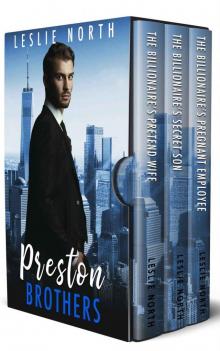 Preston Brothers The Complete Series
Preston Brothers The Complete Series The Sheikh's Furious Prisoner
The Sheikh's Furious Prisoner The Volkov Brothers Series: The Complete Series
The Volkov Brothers Series: The Complete Series A Sheikh for Christmas
A Sheikh for Christmas Redeeming the Rancher
Redeeming the Rancher The Sheikh's Pregnant Employee (Almasi Sheikhs Book 3)
The Sheikh's Pregnant Employee (Almasi Sheikhs Book 3) A Billionaire for Christmas
A Billionaire for Christmas The Sheikh's Determined Lover
The Sheikh's Determined Lover The Sheikh's Reluctant American (The Adjalane Sheikhs #3)
The Sheikh's Reluctant American (The Adjalane Sheikhs #3) Ride with the SEAL
Ride with the SEAL Zahkim Sheikhs Series: The Complete Series
Zahkim Sheikhs Series: The Complete Series The Sheikh's Unforgettable Lover (The Sharqi Sheikhs Series Book 1)
The Sheikh's Unforgettable Lover (The Sharqi Sheikhs Series Book 1) Sheikha's Determined Police Officer (Botros Brothers Series Book 4)
Sheikha's Determined Police Officer (Botros Brothers Series Book 4) The Sheikh's American Bride (The Sharqi Sheikhs Series Book 2)
The Sheikh's American Bride (The Sharqi Sheikhs Series Book 2) His Stubborn Lover
His Stubborn Lover The Sheikh's Defiant Girlfriend (The Botros Brothers Series)
The Sheikh's Defiant Girlfriend (The Botros Brothers Series) The Billionaire's Ex-Wife
The Billionaire's Ex-Wife The Russian's Secret Child (The Fedosov Family Series)
The Russian's Secret Child (The Fedosov Family Series) The Sheikh's Crown (Sheikh's Wedding Bet Series Book 2)
The Sheikh's Crown (Sheikh's Wedding Bet Series Book 2) The Sheikh's Unexpected Wife
The Sheikh's Unexpected Wife The Sheikh’s Secret Son (Sharjah Sheikhs Book 3)
The Sheikh’s Secret Son (Sharjah Sheikhs Book 3) Celi-Bet (Solomon Brothers #2)
Celi-Bet (Solomon Brothers #2) The Billionaire's Sexy Rival (Jameson Brothers Book 3)
The Billionaire's Sexy Rival (Jameson Brothers Book 3) The Sheikh's Christmas Baby (Shadid Sheikhs Series Book 3)
The Sheikh's Christmas Baby (Shadid Sheikhs Series Book 3) Royal Treatment
Royal Treatment The Sheik's Accidental Pregnancy
The Sheik's Accidental Pregnancy The Sheikh’s Contract Fiancée (Almasi Sheikhs Book 1)
The Sheikh’s Contract Fiancée (Almasi Sheikhs Book 1) Mafia Boss's Fearless Lover (The Karzhov Crime Family series Book 1)
Mafia Boss's Fearless Lover (The Karzhov Crime Family series Book 1) The Sheikh’s Surprise Heir: The Karawi Sheikhs Series Book One
The Sheikh’s Surprise Heir: The Karawi Sheikhs Series Book One Stirring up the Sheriff (Wildhorse Ranch Brothers Book 3)
Stirring up the Sheriff (Wildhorse Ranch Brothers Book 3) Secret Billionaire's Stubborn Cowgirl (The Secret Billionaires, #1)
Secret Billionaire's Stubborn Cowgirl (The Secret Billionaires, #1) Her Relentless Russian (Karev Brothers Book 3)
Her Relentless Russian (Karev Brothers Book 3) SEAL Defender (Brothers In Arms Book 1)
SEAL Defender (Brothers In Arms Book 1) Mafia Soldier's Irresistible Lover (The Karzhov Crime Family Series Book 3)
Mafia Soldier's Irresistible Lover (The Karzhov Crime Family Series Book 3) The Sheikh's Tempting Assistant
The Sheikh's Tempting Assistant The Sheik's Desires Boxset
The Sheik's Desires Boxset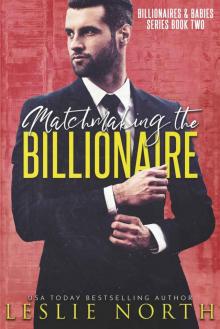 Matchmaking the Billionaire (Billionaires & Babies Book 2)
Matchmaking the Billionaire (Billionaires & Babies Book 2) Trusting the SEAL (Saving the SEALs Series Book 3)
Trusting the SEAL (Saving the SEALs Series Book 3) The Sheikh's Christmas Present (Shadid Sheikhs Series Book 2)
The Sheikh's Christmas Present (Shadid Sheikhs Series Book 2) The Sheikh’s Stubborn Assistant
The Sheikh’s Stubborn Assistant The Lord's Passionate Lover (The Royals of Monaco, #3)
The Lord's Passionate Lover (The Royals of Monaco, #3) The Sheikh’s Forced Bride (The Sharjah Sheikhs Series Book 1)
The Sheikh’s Forced Bride (The Sharjah Sheikhs Series Book 1) The Prince's Unwilling Lover (The Royals of Monaco Book 1)
The Prince's Unwilling Lover (The Royals of Monaco Book 1) The Sheikh’s Pregnant Fake Wife
The Sheikh’s Pregnant Fake Wife The Tycoon’s Fake Fiancée (European Tycoon Book 2)
The Tycoon’s Fake Fiancée (European Tycoon Book 2) Italian Billionaire’s Stubborn Lover
Italian Billionaire’s Stubborn Lover Greek Billionaire's Blackmailed Bride (The Rosso Family Series, #1)
Greek Billionaire's Blackmailed Bride (The Rosso Family Series, #1) The Sheikh's Christmas Maid
The Sheikh's Christmas Maid The Sheikh's Christmas Maid (Shadid Sheikhs Series Book 1)
The Sheikh's Christmas Maid (Shadid Sheikhs Series Book 1) Italian Billionaire’s Unexpected Lover
Italian Billionaire’s Unexpected Lover The Sheikh's Secret Bride
The Sheikh's Secret Bride The Sheikh's Unruly Lover (Almasi Sheikhs Book 2)
The Sheikh's Unruly Lover (Almasi Sheikhs Book 2) Secret Billionaire's Frosty Lover
Secret Billionaire's Frosty Lover SEAL Protector (Brothers In Arms Book 2)
SEAL Protector (Brothers In Arms Book 2) The Sheikh’s Pretend Fiancée
The Sheikh’s Pretend Fiancée Play It Safe (The Safe House Series Book 2)
Play It Safe (The Safe House Series Book 2) Rose (Thorn Tattoo Studio Book 1)
Rose (Thorn Tattoo Studio Book 1) The Sheikh's Captive American
The Sheikh's Captive American Wired (The Solomon Brothers Series Book 1)
Wired (The Solomon Brothers Series Book 1) The Sheikh's Unexpected Wife (Zahkim Sheikhs Series Book 3)
The Sheikh's Unexpected Wife (Zahkim Sheikhs Series Book 3) The Romano Brothers Series
The Romano Brothers Series The Sheikh's Surprise Triplets (Azhar Sheikhs Book 3)
The Sheikh's Surprise Triplets (Azhar Sheikhs Book 3) Battle with the SEAL
Battle with the SEAL Claiming The Cowboy
Claiming The Cowboy The Billionaire’s Sham Girlfriend: The Beaumont Brothers Book One
The Billionaire’s Sham Girlfriend: The Beaumont Brothers Book One The Sheikh's Unruly Lover
The Sheikh's Unruly Lover Shooting the SEAL (Saving the SEALs Series Book 1)
Shooting the SEAL (Saving the SEALs Series Book 1) The Sheikh's Demanding Fiancée (The Botros Brothers Series)
The Sheikh's Demanding Fiancée (The Botros Brothers Series) Owned by the Navy Seal
Owned by the Navy Seal The Billionaire’s Stubborn Lover (The Maxfield Brothers Series Book 3)
The Billionaire’s Stubborn Lover (The Maxfield Brothers Series Book 3) The Sheikh's Fiery Lover (The Tazeem Twins Series Book 2)
The Sheikh's Fiery Lover (The Tazeem Twins Series Book 2) In Safe Hands (The Safe House Series Book 1)
In Safe Hands (The Safe House Series Book 1) The Sheikh's Pregnant Fling (Azhar Sheikhs Book 2)
The Sheikh's Pregnant Fling (Azhar Sheikhs Book 2) The Sheikh's Christmas Present
The Sheikh's Christmas Present Royal Service
Royal Service The Billionaire’s Tenacious Boss (The Maxfield Brothers Series Book 1)
The Billionaire’s Tenacious Boss (The Maxfield Brothers Series Book 1) Royal Order
Royal Order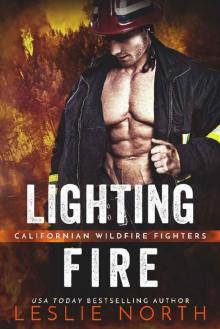 Lighting Fire
Lighting Fire Her Rogue Russian (Karev Brothers Book 2)
Her Rogue Russian (Karev Brothers Book 2) Fearless (The Solomon Brothers Series Book 3)
Fearless (The Solomon Brothers Series Book 3) The Sheikh's Diamond (Sheikh's Wedding Bet Series Book 1)
The Sheikh's Diamond (Sheikh's Wedding Bet Series Book 1) Mafia Hitman's Daring Lover
Mafia Hitman's Daring Lover Hacking the SEAL (Saving the SEALs Series Book 2)
Hacking the SEAL (Saving the SEALs Series Book 2) His Innocent Lover (Slade Security Team Series Book 3)
His Innocent Lover (Slade Security Team Series Book 3) The Prince's Pregnant Challenge (The Royals of Monaco, #2)
The Prince's Pregnant Challenge (The Royals of Monaco, #2) Undercover with the SEAL
Undercover with the SEAL Thorn (Thorn Tattoo Studio Book 2)
Thorn (Thorn Tattoo Studio Book 2) Mafia Enforcer's Sassy Lover (The Karzhov Crime Family Series Book 4)
Mafia Enforcer's Sassy Lover (The Karzhov Crime Family Series Book 4) The Sheikh's Pregnant Bride (The Jawhara Sheikhs Series Book 1)
The Sheikh's Pregnant Bride (The Jawhara Sheikhs Series Book 1)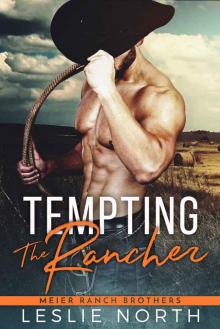 Tempting the Rancher
Tempting the Rancher Greek Billionaire's Uncontrollable Attraction (The Rosso Family Series Book 3)
Greek Billionaire's Uncontrollable Attraction (The Rosso Family Series Book 3) The Sheikh’s Island Fling
The Sheikh’s Island Fling![Battle with the SEAL_Norse Security [Book Three] Read online](http://i1.bookreadfree.com/i2/04/11/battle_with_the_seal_norse_security_book_three_preview.jpg) Battle with the SEAL_Norse Security [Book Three]
Battle with the SEAL_Norse Security [Book Three] The Sheikh’s Contract Fiancée
The Sheikh’s Contract Fiancée The Sheikh’s Tamed Bride
The Sheikh’s Tamed Bride The Sheikh’s Island Fling_Sheikh's Meddling Sisters_Book Two
The Sheikh’s Island Fling_Sheikh's Meddling Sisters_Book Two The Sheikh's Troublesome Bride
The Sheikh's Troublesome Bride A SEAL for Christmas
A SEAL for Christmas The Sheikh's Determined Lover (Zahkim Sheikhs Series Book 2)
The Sheikh's Determined Lover (Zahkim Sheikhs Series Book 2) The Sheikh’s Fake Fiancée (Azhar Sheikhs Book 1)
The Sheikh’s Fake Fiancée (Azhar Sheikhs Book 1) Healing the Quarterback (Wildhorse Ranch Brothers Book 2)
Healing the Quarterback (Wildhorse Ranch Brothers Book 2) The Sheikh's Resisting Lover (The Tazeem Twins Series Book 3)
The Sheikh's Resisting Lover (The Tazeem Twins Series Book 3) Greek Billionaire's Forbidden Lover (The Rosso Family Series Book 2)
Greek Billionaire's Forbidden Lover (The Rosso Family Series Book 2)![Undercover with the SEAL_Norse Security [Book Two] Read online](http://i1.bookreadfree.com/i2/04/11/undercover_with_the_seal_norse_security_book_two_preview.jpg) Undercover with the SEAL_Norse Security [Book Two]
Undercover with the SEAL_Norse Security [Book Two] Rescued by the Navy Seal
Rescued by the Navy Seal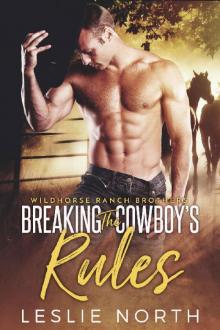 Breaking the Cowboy's Rules (Wildhorse Ranch Brothers Book 1)
Breaking the Cowboy's Rules (Wildhorse Ranch Brothers Book 1) CEO's Pregnant Lover
CEO's Pregnant Lover Royals of Danovar: The Complete Series
Royals of Danovar: The Complete Series The Sheikha's Forbidden Lover (The Tazeem Twins Series Book 5)
The Sheikha's Forbidden Lover (The Tazeem Twins Series Book 5) The Sheikh's Kidnapped Bride (The Sharqi Sheikhs Series Book 3)
The Sheikh's Kidnapped Bride (The Sharqi Sheikhs Series Book 3)